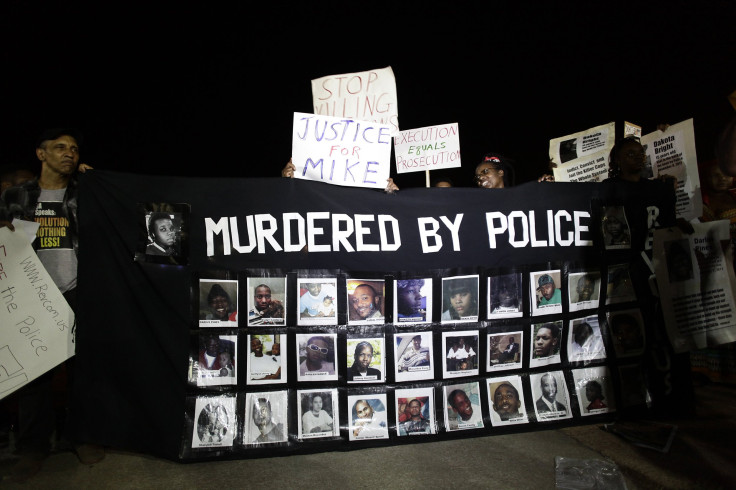Will Darren Wilson Be Indicted? Why Ferguson Grand Jury Probably Won't Charge Officer In Mike Brown Shooting

There will likely be no indictment against Darren Wilson, the white Ferguson, Missouri, police officer who shot and killed unarmed black teen Mike Brown in a case that fueled riots in the St. Louis suburb last summer, according to media reports. Those feelings are also backed up by data that show white officers are not as likely to be charged, let alone convicted, for shooting black men as civilians are.
The grand jury of seven men and five women is meeting in Clayton, Missouri, to determine whether Wilson should be criminally charged in Brown’s death. Nine of the grand jurors are white, while three are black, according to St. Louis NBC affiliate KSDK. A decision could come as early as Monday, according to one report, while St. Louis County Prosecutor Robert McCulloch said an announcement may be released anywhere from mid- to late November.
Wilson reportedly told the grand jury that he feared for his life and that he was in a struggle with Brown when he shot the 18-year-old, according to leaks of his testimony reported by the New York Times. The black teen’s blood was discovered inside Wilson’s squad car and on his uniform, and the officer claimed Brown punched him.
Results of an autopsy by the St. Louis County medical examiner obtained by the St. Louis Post-Dispatch may have shown that Brown reached for Wilson’s weapon, as the officer claimed, according to NBC News. But another examination of Brown’s body, conducted by the forensic pathologist Dr. Michael Baden on behalf of the Brown family, didn’t come to that conclusion. The private autopsy determined that Brown was shot six times and not at close range, which could indicate there wasn’t a struggle at the time of the shooting. A third autopsy was conducted by the Justice Department, which is heading a civil rights probe into the incident but did not publicly release its findings.
Despite eyewitnesses claiming Brown had his hands up and was surrendering when he was shot, and a video that may support that contention, Wilson’s leaked testimony has supported the growing view that he won’t be indicted. Another signal that Brown’s supporters say point to no indictment for Wilson is that local law enforcement is bracing for protests. Similar plans are being hatched at police departments across the country.
“We are getting prepared for war,” Ferguson resident Ronardo Ward, 33, told St. Louis’ CBS affiliate last week. “And that’s just crazy.”
The Aug. 8 shooting sparked violent protests shortly after the incident in Ferguson, which led to looting and a QuikTrip convenience store being burned to the ground. Demonstrations have taken place on an almost daily basis since then, although the protests have been peaceful.
The consequences of police-involved shootings, or the lack of them, are visible in Oakland, California, where blacks represented all but eight of the 45 instances of police-involved shootings from 2004 to 2008, according to the San Francisco Chronicle. No officers faced charges stemming from those cases, even though there were no weapons found on the victims in 40 percent of the incidents.
White officers tend to use force against black suspects more than white ones, Delores Jones-Brown, a former prosecutor and a law professor at the John Jay College of Criminal Justice in New York City, told Mother Jones.
"Unfortunately, the patterns that we've been seeing recently are consistent: The police don't show as much care when they are handling incidents that involve young black men and women, and so they do shoot and kill," she said. “And then for whatever reason, juries and prosecutors' offices are much less likely to indict or convict."
Unlike civilians, police have more discretion over when they can use deadly force.
“It’s a very simple analysis, a threat analysis,” Geoffrey Alpert, a professor at the University of South Carolina who studies when and how police use deadly force, told the Times. "If a police officer has an objectively reasonable fear of an imminent threat to his life or serious bodily harm, he or she is justified in using deadly force," he said. "And not just his life, but any life.”
© Copyright IBTimes 2024. All rights reserved.












